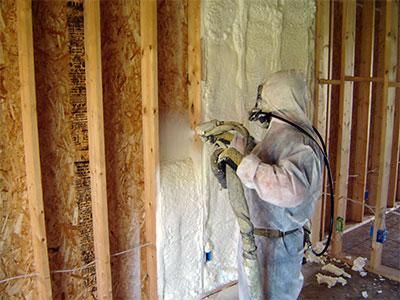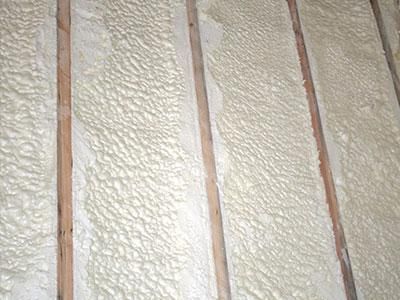Open Cell Spray Foam Insulation in Kansas City
Open cell spray foam is the best value when it comes to spray foam insulation. When it is sprayed, open cell spray foam fills every gap, crack, and crevice effectively sealing off unwanted airflow. Open cell spray foam, like most spray foams on the market, is a two-part polyurethane plastic insulation that is manufactured on site. This two-part spray foam insulation requires specialized equipment and trained professionals to be installed correctly, which our spray foam insulation contractors at KC Spray Foam & Coatings, LLC are qualified to install and inspect.
About Open Cell Spray Foam Insulation
Some other spray foam companies will bash open cell spray foam making false claims that it will absorb moisture with its lower R-value in comparison to closed cell spray foam.
However, open cell spray foam will not magically absorb water, similarly to a kitchen sponge on your counter will not absorb water without being placed in water. Most of these companies making these claims exclusively sell closed cell spray foam. Since we offer both closed cell and open cell spray foam insulation, we can provide accurate insight about open cell spray foam insulation and its benefits. Our goal is to utilize the best type of spray foam for your specific need and budget.
One feature of open cell spray foam is that it has an R-value of 3.5-4 per inch. The “R” stands for the resistance to heat flow. The higher the R-value, the greater the insulation power. With open cell spray foam insulation an R-value of 4 per inch can reduce heat transfer by 94.72%. Unlike fiberglass or blown cellulose insulation, open cell spray foam does not need to be 12-14 inches thick to in attempt to overcompensate for fiberglass and cellulose insulation’s lack of air sealing capabilities. Thus, open cell spray foam insulation has many advantages because of its superior air sealing capabilities.

Three Advantages of Open Cell Spray Foam Insulation
1. Superior Air Sealing
Superior air sealing is open cell spray foam’s real advantage over regular fiberglass or blown cellulose insulations. Modern building codes require builders to provide insulation and an air barrier in construction projects. Open cell spray foam insulation fulfills both requirements in a cost-effective manner.
2. Dust and Pollen Reduction
Another advantage of the air-sealing capabilities of open cell spray foam is that it can reduce the amount of dust and pollen getting into a home. Customers have reported they do not have to dust their homes as frequently because of this unique benefit of open cell spray foam.
3. Sound Transfer Reduction
Not only does open cell spray foam work great as both an insulation and air barrier, it is also great at reducing sound transfer. We have utilized open cell spray foam in home theaters, bedrooms, laundry rooms, offices, and between floors to reduce sound transfer. Many customers comment after installation how quiet their home is.

FAQs About Open Cell Spray Foam Insulation
Where can you install open cell spray foam insulation?
Walls, attics, rim joists, garages and pole barns are a great fit for open cell spray foam. We generally use open cell spray foam in above grade, interior applications only. It can also be used for a sound barrier for theater rooms, bathrooms and plumbing pipes.
What is the biggest advantage to open cell spray foam insulation?
Open cell spray foam insulation is an affordable solution to reducing energy costs, creating a sound barrier, and is mold resistant. Each of theses benefits provides an overall advantage to your home or building.
Is open cell spray foam better than closed cell spray foam?
For interior purposes open cell spray foam is generally better than closed cell spray foam because it expands after it is applied providing a better sealing effect. Open cell spray foam will reach into those nooks and crannies in your home. In addition, open cell spray foam is excellent for sound proofing your home. Depending on what your insulation goals and budget constraints are, open cell spray foam or closed cell spray foam could both be great choices. Check out our closed cell spray foam to learn more about when closed cell spray foam might be a better choice!
What does "Open Cell" mean in relation to spray foam insulation?
The blowing agent in Open Cell is water. When the water and carbon dioxide react, the cells expand to point of bursting. This creates a much better yield from the raw materials, thus making the product lower priced. This mechanism gives open cell spray foam better sound proofing capability. Additionally, open cell spray foam is still an air seal. In closed cell spray foam, the cells are expanded by the blowing agent, just not to the point of bursting.
Content Reviewed by Mark King